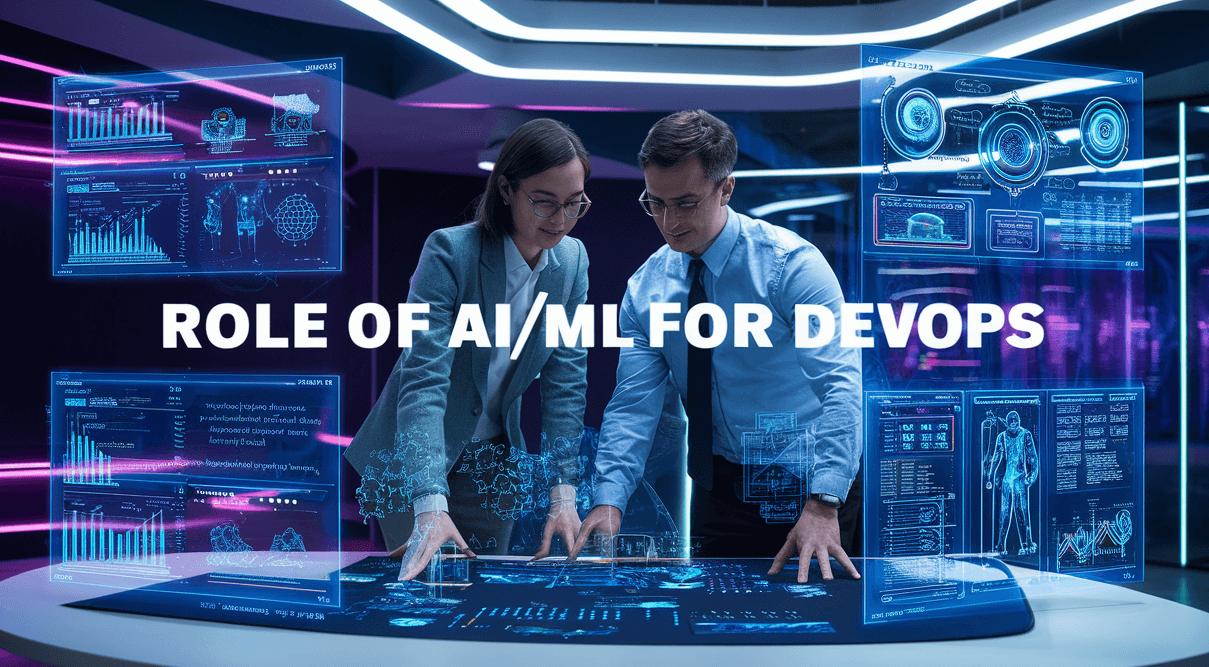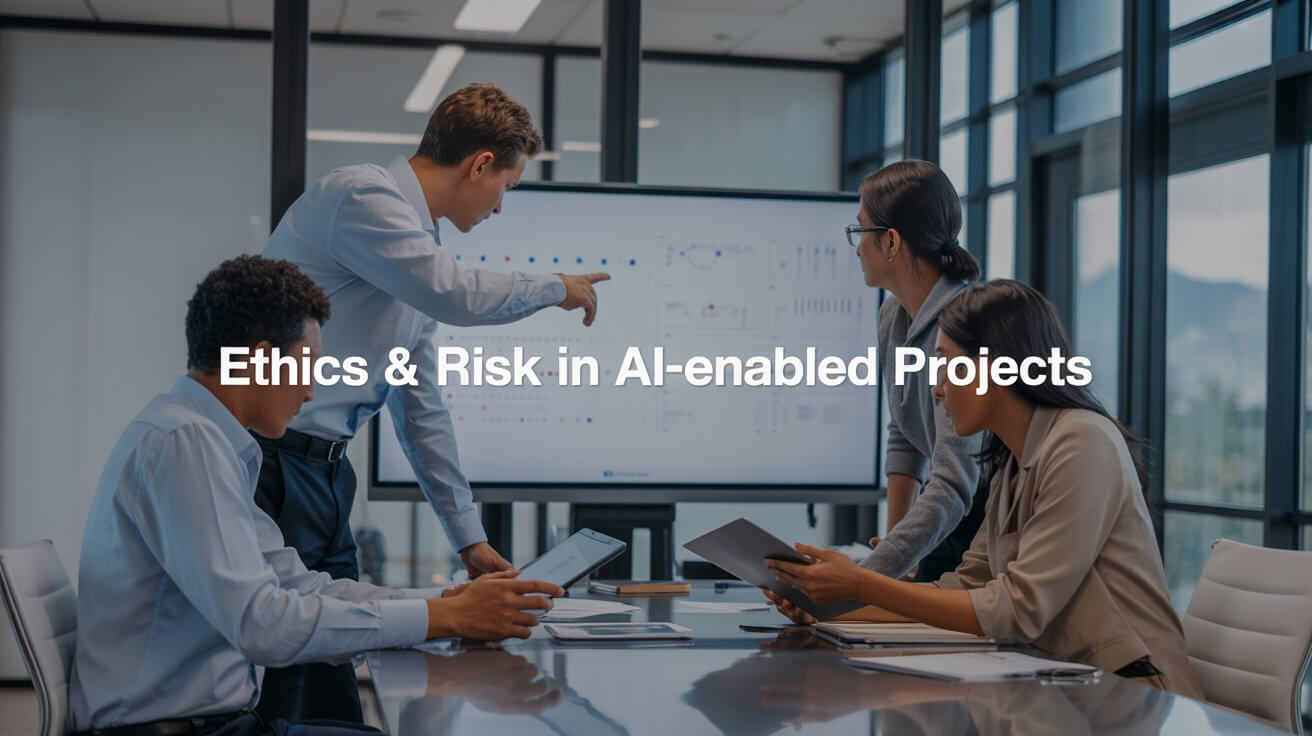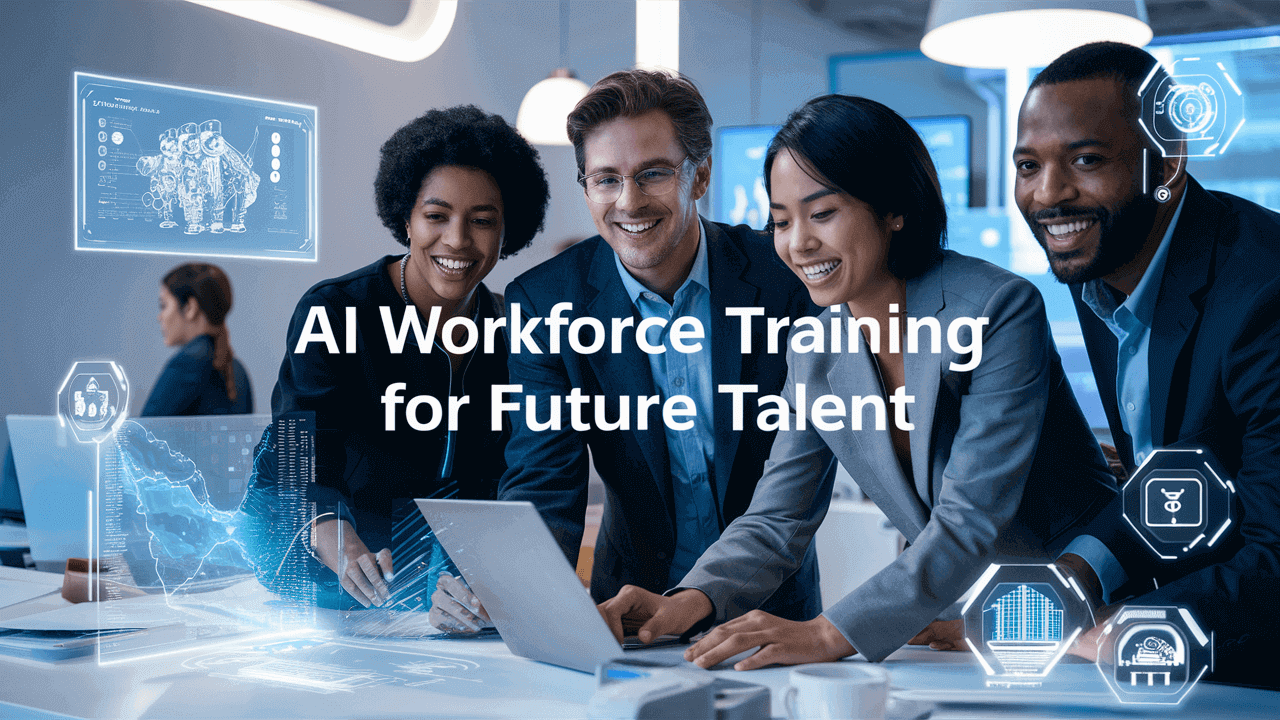The fusion of DevOps and AI/ML is not just a pairing; it’s a game-changing alliance rewriting the playbook. Nowadays, organizations are pushing the pedal to the metal in their race towards digital transformation. Simultaneously, DevOps practices are evolving from human-intensive tasks to smarter automated processes. The transformative synergy of Artificial Intelligence and Machine learning powers this. Thus, AI for DevOps is not just an enhancement. It is a necessity that steers innovation and efficiency in administering complex infrastructures and workflows.

Jump ahead to
DevOps in Digital Spotlight
Before diving into AI/ML waters, let’s set the stage. DevOps is the brainchild of development and operations collaboration. It, in fact, thrives on automation, integration, and agility. Yet, as the systems become more complex, workloads skyrocket, and our traditional tools and processes start to show cracks in the armor.
AI/ML is a secret sauce DevOps needs to turbocharge its capabilities. They are not here to replace DevOps Engineers. However, they act as co-pilots who steer through the uncertain territories of efficiency and accuracy.
AI/ML Symphony in DevOps
Before embedding AI/ML into your organizational framework, take a moment to envision the opportunities it can bring to the table.
Enhanced Monitoring
In traditional DevOps, monitoring tools act like fire alarms. It alerts teams only when something has gone wrong. But, leveraging AI for DevOps monitoring takes a quantum leap.
- AI-Powered Insights– AI tools can analyze patterns in real-time. Thus, it can predict the potential issues before they flare up. This can be a crystal ball for your infrastructure.
- Anomaly Detection– ML algorithms can help you to sniff out deviations from the norm. This helps in flagging them better than a human eye ever could.
Automated Troubleshooting: A Stitch in Time
Gone are the days of sifting through the logs like searching for a needle in a haystack. AI for DevOps tools goes through logs and diagnoses problems in the blink of an eye.
- Root Cause Analysis– MI Models identify the root causes of incidents and suggest fixes faster than a DevOps Engineer.
- Self-Healing Systems– AI systems not only detect problems but also apply predefined solutions that minimize the downtimes.
CI/CD Pipelines: The Rocket Fuel of Automation
Continuous Integration and Continuous Deployment (CI/CD) are the lifelines of DevOps. They make deployments faster than ever.
- Code Quality Checks– AI scans codes for vulnerabilities, bugs, and inefficiencies before they even hit production.
- Deployment Automation– MI models analyze deployment history and refine processes for efficiency.
Capacity Planning: Reading the Tea Leaves
Scaling infrastructure manually is like trying to predict the weather. AI for DevOps simplifies this with info-centric predictions about the resource requirements.
- Zestful Scaling-ML algorithms forecast traffic spikes which ensures servers scale up or down automatically.
- Cost Optimization-AI pinpoints underutilized resources which saves you a pretty penny on cloud bills.
Security Fortification: Building a Digital Fort Knox
DevSecOps has become a crucial aspect of the DevOps ecosystems, and AI/ML is the ultimate sentinel guarding your fortress.
- Threat Detection– AI identifies threats and vulnerabilities in the actual time. This includes insider threats to DDoS attacks.
- Automated Patching– ML automates the vulnerabilities. It ensures that your systems stay secure around the clock.
A Glimpse of Benefits of ML and AI for DevOps
Now, let’s take a closer look at the remarkable advantages that AI offers for DevOps Success.
- Lightning Fast Process– Automation and Predictive Analytics mean faster deployments, quicker fixing, and seamless scaling.
- Enhanced Reliability– Even under heavy workloads the systems remain stable with minimum errors.
- Cost Efficiency– Orderly resource usage and automated troubleshooting reduce operational costs.
- Team Empowerment– DevOps Teams can focus on tactical tasks in the place of firefighting, boosting morale and productivity.
Challenges of Integrating AI/ML in DevOps
Despite the rosy picture blending Artificial Intelligence and Machine Learning into DevOps is not a walk in the park.
- Data Dependency– AI models need large and high-quality datasets to be effective.
- Complexity– Integrating AI tools into the existing workflows requires thorough expertise and careful planning.
- Cost of Implementation– Advanced AI and ML tools can burn a hole in the pocket which is particularly effective for small-scale enterprises.
Top AI Tools for DevOps in 2025
It’s the time to explore the standout AI tools that make waves in the world of DevOps.
- CodeGuru– Amazon’s AI-powered code reviewer and performance profiler enhances code quality and upgrades applications.
- GitHub Copilot– This is an AI assistant for developers. It generates code snippets, automates repetitive tasks, and improves productivity.
- Datadog– It is a monitoring and analytics platform using AI for real-time insights. It detects anomalies and seamless DevOps integration.
- Sysdig– This is an AI-enhanced tool for container security and performance governance. This ensures efficient DevOps workflows.
- Synk– This can be a developer-first tool focused on recognizing and fixing vulnerabilities in code., open-source libraries, and containers.
- ClickUp– It is a versatile project management tool with AI capabilities to automate fast-tracking, prioritization, and collaboration.
- Jenkins X– This is a next-gen CI/CD tool leveraging AI for automated testing and Kubernetes deployments.
- Dynatrace– It is an AI-driven application for performance monitoring. It offers predictive analytics and proactive issue resolution.
Future of AI for DevOps
The future of AI for DevOps shines brighter than ever. It promises a revamping leap into smarter and more efficient workflows. As AI continues to evolve its role in DevOps, it will grow from a supportive sidekick to a full-fledged hero. It automates complex tasks and predicts challenges before they arise. With the integration of AI-driven ChatOps, DevOps teams will govern operations swiftly. At the same time, edge AI affirms optimization closer to the user. The rise of NoOps is where operations are almost entirely automated. This means that DevOps teams can focus more on innovation than integration.
Moreover, AI will empower businesses to scale operations seamlessly without compromising quality or agility. As the old adage goes “Actions speak louder than words”, the future of AI or Ml for DevOps is set to showcase measurable and groundbreaking outcomes. The horizon is not the boundary but it’s merely the launchpad of greater possibilities.
The Bottom Line
AI and ML are not just buzzwords. They are the rocket fuel propelling DevOps into the future. Their applications are diverse and transformative from predictive monitoring to self-healing systems. Mastering this through Artificial Intelligence for DevOps Training is no longer a luxury but it is an imperative career move to stay competitive in the dynamic DevOps realm. Alongside Al/ML Certifications other attestations like AWS Cloud Practitioner and AWS Professional DevOps Engineer can further boost proficiency and career prospects. As businesses continue to embrace these technologies you can be certain of one thing, AI is redefining DevOps. So buckle up, with AI for DevOps, its future is smarter, faster, and more innovative than ever.
FAQs
What is AI for DevOps?
It refers to the integration of artificial intelligence and machine learning technologies into DevOps processes. It helps in automating tasks, predicting issues, enhancing performances, and fine-tuning workflows.
How does AI improve DevOps?
AI enhances DevOps by:
- Automating repetitive tasks
- Providing predictive insights
- Enabling faster issue resolution
- Improving system performance through data-driven decisions
Why should I learn AI for DevOps?
There are several benefits, including staying competitive, offering boosted skills to automate tasks, improving efficiencies, and leading innovation within DevOps contexts.
Can AI predict system failures in DevOps?
Yes, AI can analyze historical data and detect patterns. This aids in predicting system failures before they occur which allows proactive troubleshooting.
How can AI assist in security within DevOps?
AI is capable of enhancing security within DevOps by detecting vulnerabilities earlier. It automates security testing and continuously monitors systems for potential threats in real-time.
What role does machine learning play in DevOps?
Machine Learning in DevOps analyzes large volumes of data, predicts issues, detects security threats, and advances the performance of systems through adaptive learning.
Is AI/ML for DevOps suitable for smaller teams?
Yes, it can scale to meet the needs of both large and small DevOps teams. It boosts productivity and efficiency without requiring large resources.



